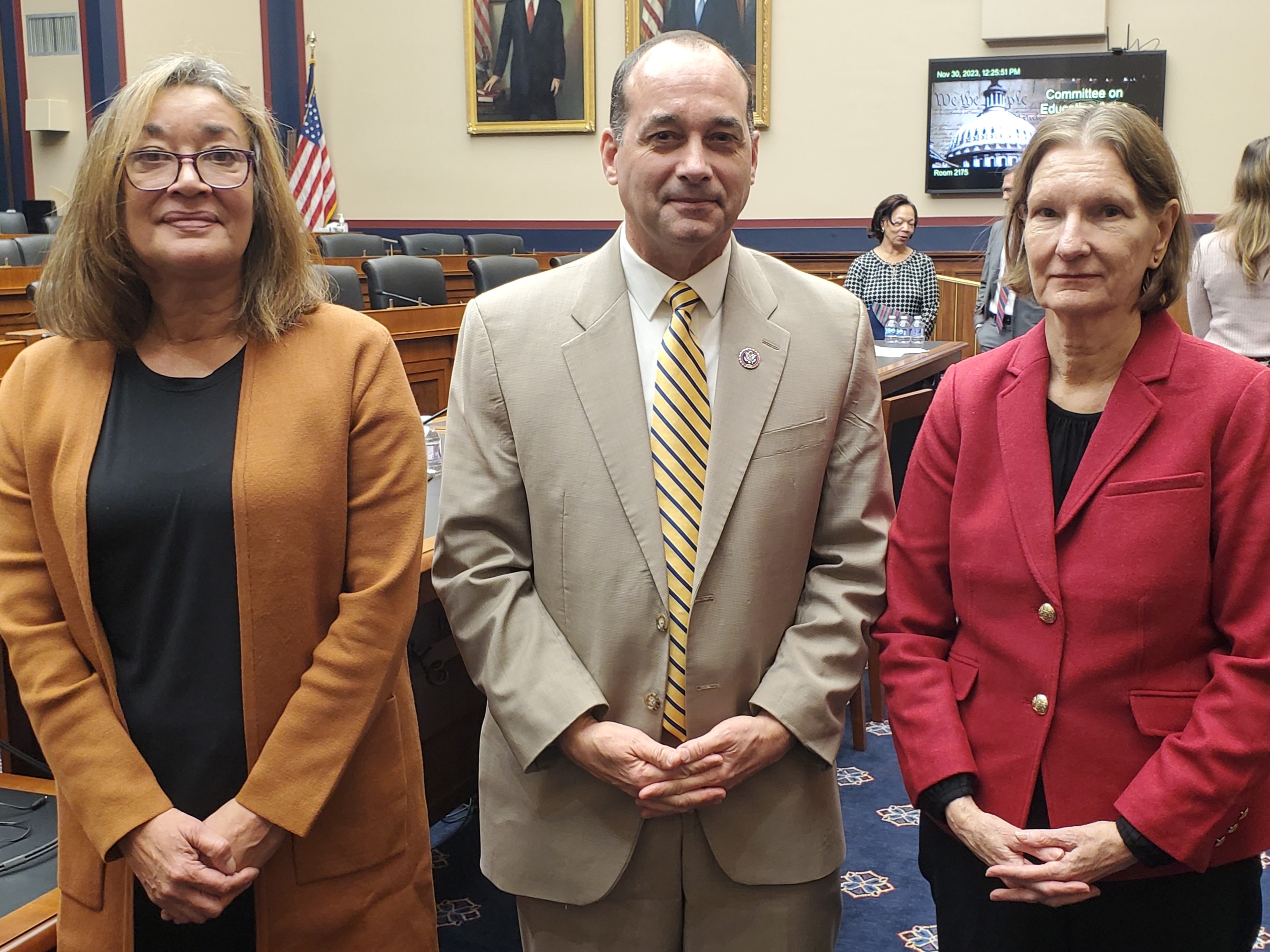The following article is from the National Right to Work Legal Defense Foundation’s bi-monthly Foundation Action Newsletter, March/April 2024 edition. To view other editions of Foundation Action or to sign up for a free subscription, click here.
Workers’ real-life battles against union bosses emphasize need to end forced union dues
Foundation clients Brunilda Vargas (left) and Jeanette Geary (right) testified to Rep. Bob Good (center) and other members of the House Education and Workforce Committee about the danger forced dues still pose to America’s workers.
WASHINGTON, DC – In November, two recipients of National Right to Work Foundation free legal representation went to Capitol Hill to testify before the U.S. House Committee on Education and the Workforce about their battles against union bosses.
This was the first-ever congressional hearing on the National Right to Work Act, legislation that will safeguard American private sector workers’ freedom to refrain from paying dues to an unwanted union.
Jeanette Geary, a retired nurse, and Brunilda Vargas, a Philadelphia-based public defender, both successfully challenged illegal forced-dues demands with Foundation aid. Their testimony at the hearing, alongside Foundation President Mark Mix, gave policymakers stark examples of how union officials often manipulate their forced-dues powers to advance coercive agendas over the objections of workers.
Vargas, Geary Share Stories of Union Coercion
The current federal law governing most private sector workers in America — the National Labor Relations Act (NLRA) — grants union bosses the power to force workers to pay union dues just to keep their jobs. Only by passing Right to Work laws can states protect workers covered by the NLRA from forced dues.
Meanwhile, airline and railroad employees covered by the Railway Labor Act (RLA) can be required to pay union dues no matter where they work because federal law prevents them from being covered by state Right to Work laws. The one-page National Right to Work Act discussed in the hearing would repeal the portions of both the RLA and NLRA that authorize union officials to require union payments as a condition of employment.
“We’re proud and thankful that Ms. Geary and Ms. Vargas both agreed to testify before Congress on the struggles independent-minded workers face every day because of federal law’s lack of protection for worker freedom,” Mix commented. “Union bosses and their allied politicians don’t want to hear it, but the truth is rank-and-file workers are the victims of Big Labor’s government-granted coercive powers, which makes the stories of those victims especially powerful.”
Geary discussed her struggle against United Nurses and Allied Professionals (UNAP) union bosses, who subjected her and her fellow nurses in Rhode Island to an illegal scheme in which they were compelled to pay for union political expenditures, including lobbying in state legislatures. Geary fought UNAP union officials over the illegal dues demands for 12 years with free legal representation from Foundation staff attorneys. She finally prevailed in 2021, when the First Circuit Court of Appeals unanimously ruled in her favor and rejected a union appeal.
Vargas and Geary: Unions Purposely Hide Rights from Employees
“Unions do not tell employees about their rights because union officials have no incentive to do so, and regular employees without lawyers . . . are left to fend for themselves,” Geary testified before the House Committee. “This is America, and membership in a union and payment of dues should be strictly voluntary.”
Vargas testified about her case against United Auto Workers (UAW) union officials, who threatened to dock the salary of her and any other public defender in her office who refused to let the union seize money directly from their paychecks. Under federal law, even in forced-dues states, union officials must obtain express consent from workers before taking dues money by direct deduction. With Foundation legal aid, Vargas secured a favorable finding from the National Labor Relations Board (NLRB) that initiated a formal prosecution against the union. Eventually, UAW union bosses were forced to settle the matter and end their illegal conduct.
“As attorneys, we do have a level of sophistication when it comes to the law and legal processes. However, I cannot imagine a lay person having to face this type of pressure. I believe that most people sign union membership and authorization cards because they believe they have no choice, and they are often told that,” Vargas testified.







